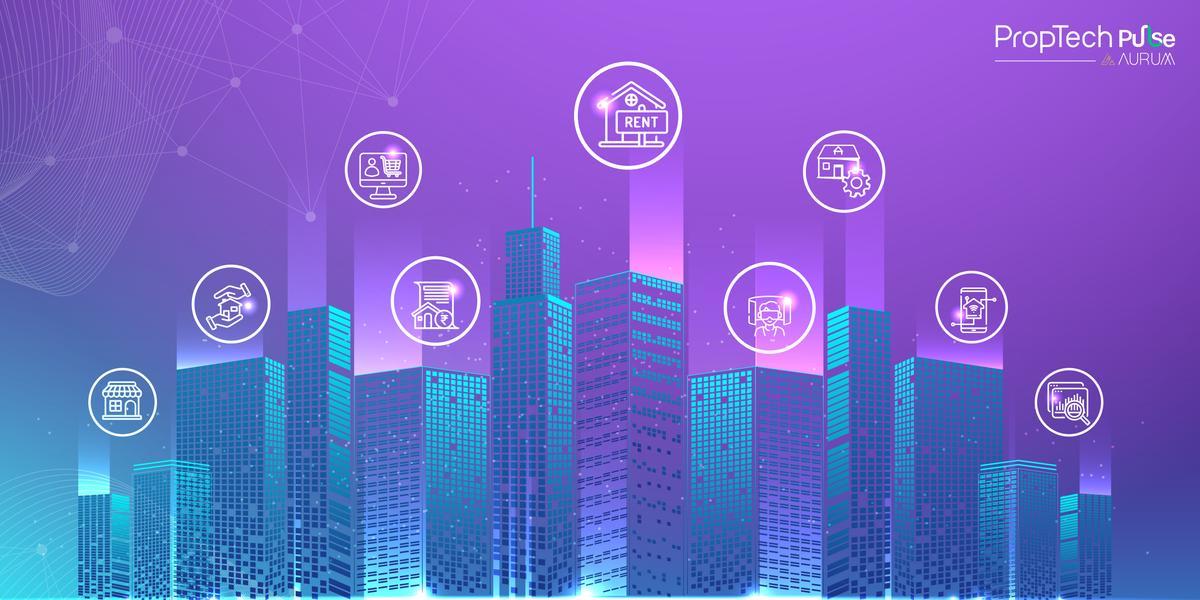Real Estate Efficiency

Introduction to PropTech
The property sector faces a digital revolution through the emergence of PropTech Business Models. PropTech stands for Property Technology, which uses technology to transform and optimize real estate procedures, such as purchasing, selling, renting, and owning property.
As technology plays a prominent role in property transactions, companies embrace cutting-edge solutions to make them more efficient, transparent, and accessible. PropTech Business Models cover a range of strategies, from platform-enabled solutions to data-derived value models, transforming how properties are sold, bought, and managed.
Key Drivers Behind the Rise of PropTech Business Models
Multiple reasons have led to the fast adoption of PropTech Business Models:
- Digital Transformation: The convergence of AI, blockchain, and IoT is simplifying property transactions.
- Consumer Demand: Contemporary consumers and tenants are demanding smooth, digital-first property experiences.
- Investment Growth: Venture capital investments in PropTech Business Models have increased, fueling innovation and growth.
- Regulatory Support: Smart city policies and digital property transaction policies by the government are giving the sector a boost.
Types of PropTech Business Models in the Market
The property market is experiencing revolutionary change with the advent of innovative PropTech Business Models targeting various needs. These models use technology to improve real estate transactions, management, and finance, transforming property processes to become more effective and accessible.
Platform-Based Business Models
Platform-based PropTech Business Models are intermediaries that link buyers, sellers, and renters. Indian startups such as Aurum PropTech, Housing.com, and MagicBricks provide online platforms that simplify property searching and transactions. These models earn revenue through listing charges, commissions, and paid subscriptions.
Subscription-Based Services for Property Management
Companies like MyGate and NoBrokerHood have implemented subscription-based PropTech Business Models, offering end-to-end property management services. They simplify security, rent collection, and maintenance operations for residential societies and offices.
Data-Driven Models for Real Estate Valuation
Correct valuation of property is important in real estate, and startups such as CREMatrix use big data and AI for computerized real estate valuation. PropTech Business Models in this category provide information on pricing trends, risk analysis, and investment potential.
Marketplace Models for Buying and Selling Properties
Startups like 99acres and Square Yards follow a marketplace PropTech Business Model, allowing customers to purchase, sell, or lease properties. These websites offer virtual tours, legal services, and funding options to improve customer experience.
Proptech’s Role in Digital Transformation of Real Estate
As PropTech redefines the property landscape, automation is also improving operational efficiency. From CRM solutions to AI applications, companies use technology to streamline workflows and make better decisions.
Enhancing Operational Efficiency Through Automation
PropTech Business Models utilize automation software to enhance real estate operations. Aurum PropTech's CRM system, Sell.Do allows real estate developers to deal with leads, sales, and marketing campaigns efficiently, minimizing manual handling and enhancing ROI.
IoT Integration for Smart Buildings
IoT-enabled PropTech Business Models enable intelligent building management, energy efficiency, and predictive maintenance. Indian startups such as Zenatix and WEGoT use IoT sensors to track energy and water usage, encouraging sustainable real estate practices.
Virtual & Augmented Reality for Property Showcasing
VR and AR tools allow potential buyers to take virtual property tours, reducing the need for physical site visits. Indian PropTech firms like SmartVizX and Foyr provide immersive 3D experiences, enabling faster decision-making for real estate transactions.
Digital Mortgage & Loan Processing
FinTech integration in PropTech simplifies mortgage applications and loan approvals. AI-powered underwriting models and digital KYC streamline financing for homebuyers. Companies like HomeCapital and LoanTap are enhancing real estate financing with seamless digital solutions.
SaaS-Based Property Management Platforms
Software-as-a-Service (SaaS) solutions offer end-to-end property management, handling rent collection, tenant screening, and maintenance requests. Platforms like MyGate and NoBrokerHood help housing societies and landlords automate day-to-day operations efficiently.
Case Studies: Successful PropTech Business Models
Analyzing real-life success helps us understand how PropTech business models lead to change. Airbnb, the market leader in the marketplace model, transformed short-term rentals by bridging property owners and travelers using an intuitive digital platform.
Airbnb: The Marketplace Model for Short-Term Rentals
Airbnb innovated the PropTech Business Model by developing a global short-term rental marketplace. The platform connects travelers and homeowners, facilitating an effortless rental process through digital booking, secure payments, and AI-based recommendations.
Opendoor: Disrupting Home Buying with Data and Algorithms
Opendoor's AI-based home-buying process enables sellers to get instant offers, making property transactions easier. This PropTech Business Model has picked up steam by cutting out intermediaries and providing smooth digital experiences.
Zillow: Revolutionizing Real Estate Listings with AI & Big Data
Zillow pioneered the digital real estate marketplace by providing property listings, home valuations (Zestimate), and AI-powered insights. Its big data analytics help buyers, sellers, and agents make informed decisions, making property searches more transparent and efficient.
WeWork: The Co-Working Subscription Model
WeWork reshaped commercial real estate by offering flexible office spaces on a subscription basis. Its tech-driven platform enables businesses and freelancers to find workspace solutions with ease, driving the adoption of shared offices in urban markets.
NoBroker: Eliminating Middlemen in Property Rentals & Sales
India-based NoBroker disrupted the traditional real estate brokerage model by directly connecting tenants and buyers with property owners. Using AI-driven matchmaking, digital verification, and paperless transactions, it reduces dependency on brokers, lowering costs for users.
Indian PropTech Startups Leading the Way
Aurum PropTech
Aurum PropTech leads India's PropTech Business Models with its range of digital solutions for developers and investors. From managing property to using artificial intelligence-based valuation, it's transforming India's real estate market.
Other PropTech Startups in India
- Brigade REAP: First such accelerator for PropTech startups that focuses on India's real estate.
- NoBroker: Facilitates transactions sans brokers between buyer and seller directly.
- NestAway: A home rental marketplace managed by professionals simplifying the renting process.
- PropTiger: A full-stack real estate services provider providing advisory, transaction, and financing solutions.
Challenges and Opportunities for PropTech Entrepreneurs
Though PropTech offers immense opportunities, entrepreneurs have to navigate regulatory hurdles. It is important to understand legal frameworks, compliance requirements, and changing policies to scale innovations without hitting roadblocks in the real estate sector.
Navigating Regulatory Hurdles
Compliance with policies of the government and real estate laws is of paramount importance to PropTech Business Models. Maintaining data security, transparency, and legality is a constant challenge.
Scaling PropTech Businesses Globally
Scaling up PropTech Business Models globally involves adjusting to varying real estate legislations, consumer attitudes, and economic landscapes. Aurum PropTech and NoBroker are slowly expanding their operations outside India.
Adoption Resistance & Market Education
While PropTech innovations can enhance efficiency, many real estate stakeholders—developers, brokers, and consumers—hesitate to adopt new technology. Educating the market on the benefits of automation, AI-driven analytics, and digital transactions is crucial for wider adoption.
High Initial Investment & Long ROI Cycle
Developing cutting-edge PropTech solutions requires significant investment in technology, infrastructure, and compliance. The return on investment (ROI) can be slow, making it essential for startups to secure strategic funding and partnerships.
The Future of PropTech Business Models: What to Expect?
- AI-Driven Insights: AI-based analytics for property suggestions and pricing strategies will be used by more startups.
- Blockchain for Transactions: Blockchain will help increase transparency and security in property transactions.
- Metaverse Real Estate: Virtual property investment will go mainstream, creating new revenue channels for PropTech Business Models.
- Sustainability Initiatives: Energy-saving intelligent buildings will be the hallmark of future developments.

AI Agent
25 Feb 2026
4 Min Read
Decision Momentum Index in Real Estate: How Pulse AI Tracks Buyer Forward Movement

AI Agent
24 Feb 2026
4 Min Read
Information Parity Engine in Real Estate How Pulse AI Ensures Equal Buyer Clarity

AI Agent
23 Feb 2026
4 Min Read
Buyer Risk Calibration in Real Estate: How Pulse AI Balances Perceived Uncertainty
Unlock the Latest in Real Estate
News, Infographics, Blogs & More! Delivered to your inbox.
“Data that drives action. Insight that inspires action. Technology that empowers action.“
“Data that drives action.
Insight that inspires action.
Technology that empowers action.“






